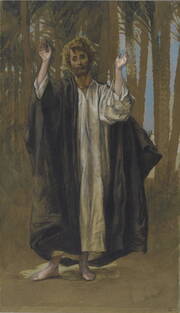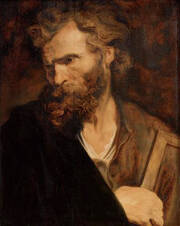Apostles St Simon and St Jude
Feast Day - 28th October
Sarah, from the USA ![]()
"My favorite saint is Saint Jude because he's the patron saint of lost causes."
Catechesis by Pope Benedict XVI
Simon the Canaanite & Jude Thaddeus
General Audience, Wednesday 11 October 2006 - also in Croatian, French, German, Italian, Portuguese & Spanish
"Dear Brothers and Sisters,
Today we are taking into consideration two of the twelve Apostles: Simon the Cananaean/Canaanite and Jude Thaddaeus (not to be confused with Judas Iscariot). We are considering them together, not only because in the lists of the Twelve they are always refered/reported/placed next to each other (cf Mt 10, 4; Mk 3, 18; Lk 6, 15; Acts 1, 13), but also because there is not much information about them, apart from the fact that the New Testament Canon preserves one letter attributed to Jude Thaddaeus.
Simon receives an epithet/is given a nickname that varies in the four lists: while Matthew and Mark qualify/describe him as "Canaanite/Cananaean", Luke instead defines him (as) "zealot". In reality, the two qualifications are equivalent, because they mean the same thing: in the Hebrew language/Hebrew, in fact, the verb qanà' means "to be jealous, passionate" and can be said to be/both of God, as/since he is jealous with regard to the people chosen by him/his chosen people (cf Ex 20, 5), and also of men who burn with zeal in serving the one God with full dedication, like Elijah (cf 1 Kgs 19, 10). It is quite possible, therefore, that this Simon, if not properly belonging to the nationalist movement of Zealots, was at least characterized by an ardent zeal for the Jewish identity, thus for God, for his people and for the divine Law. If this was the case, Simon stands at the antipodes of/was worlds apart from Matthew, who on the contrary, as a tax collector/publican, came from an activity considered totally impure. A clear sign that Jesus calls his disciples and collaborators from the most diverse social and religious strata/backgrounds, without any preclusion. He is interested in people/persons, not social classes or labels! And the beautiful thing is that in the group of his followers, (they) all, though different, coexisted together, overcoming the imaginable difficulties: Jesus himself was, in fact, the motive for cohesion, in whom they all found themselves united. This clearly constitutes a lesson for us, (who are) often inclined to underline the differences and even the contrasts, forgetting that in Jesus Christ the strength is given to us/we are given the strength to settle our conflicts. Let us also keep in mind that the group of the Twelve is the prefiguration of the Church, in which/where there must be space/room for all the charisms, peoples, races, all the human qualities, that find their composition and their unity in communion with Jesus.
Then with regard to Jude Thaddaeus, he is so called by tradition, joining together two different names: in fact, whereas Matthew and Mark call him simply "Thaddaeus" (Mt 10, 3; Mk 3, 18), Luke calls him "Judas, son of James" (Lk 6, 16; Acts 1, 13). The nickname "Thaddaeus" is of uncertain origin and is explained either as coming from the Aramaic taddà', which means "breast/chest" and would therefore signify "magnanimous", or as an abbreviation of a Greek name like "Teodòro, Teòdoto". Little about him has been handed down. Only John reports a question he made/addressed to Jesus during the Last Supper. Thaddaeus says to the Lord: "Lord, how did it happen that you must manifest yourself to us and not to the world?" It is a question of great actuality/very timely question, which we too ask/put/address to the Lord: why did the Risen One not manifest himself in all his glory to his adversaries so as to show that God is the victor? Why did he manifest himself only to his Disciples? Jesus' response is mysterious and profound. The Lord says: "If anyone loves me, he will observe/keep my word, and my Father will love him, and we will come to him and dwell/make our home with him" (Jn 14, 22-23). This means that the Risen One must be seen, also perceived with the heart, in a way that God can dwell in us. The Lord does not appear as a thing. He wants to enter into our life/lives and therefore his manifestation is a manifestation that implies and presupposes an open heart. Only thus do we see the Risen One.
To Jude Thaddaeus has been attributed the paternity of one of the Letters of the New Testament which are called "catholic" as they are addressed not to a specific local Church but to very wide circle of recipients. It is in fact directed "to the elect who live in the love of God the Father and have been preserved through/for Jesus Christ" (v 1). A major preoccupation of this writing is to put Christians on guard against all those who take the pretext of God's grace to excuse their own dissoluteness/debauchery/licentiousness and to mislead/corrupt their brethren with unacceptable teachings, introducing divisions within the Church "under the pressure of their dreams/in their dreamings" (v 8), as Jude defines their particular doctrines and ideas. He even compares them to fallen angels, and with strong terms says that "they have walked the road of Cain" (v 11). Furthermore he notes/boils/bubbles them without reticence "as waterless clouds/clouds without rain carried along by winds or end of season trees without fruit/fruitless trees in late autumn, twice dead, uprooted; as wild waves of the sea, which froth their own ugliness/shame; as wandering stars, to whom the mist of darkness is reserved for ever" (v 12-13).
Today we are no longer perhaps accustomed to using such polemical language, which nevertheless tells us something important. In the midst of all the temptations that there are, with all the currents of modern life, we must conserve/preserve the identity of our faith. Certainly, the way of indulgence and dialogue, which/that the Second Vatican Counsel has happily undertaken, should of course be followed with firm constancy. But this way of dialogue, (while) so necessary, must not make us forget the duty to rethink and to highlight just always with equal force the main and indispensable lines/aspects of our Christian identity. Again/Moreover, it is necessary to keep clearly in mind that our identity requires strength, clarity and courage in front of the contradictions of the world in which we live. Therefore the epistolary text continues (as follows): "But you, beloved" - he is speaking to all of us - "build your spiritual edifice upon your most holy faith, pray through the Holy Spirit, keep yourselves in God's love, await the mercy of our Lord Jesus Christ for eternal life; convince those who are faltering ..." (v 20-22). The Letter concludes with these most beautiful words: "To the one who can preserve you from every fall and make you appear before his glory without defects and in rejoicing, to the only God, our saviour, through Jesus Christ our Lord: glory, majesty, strength/dominion and power/authority before all time, now and for ever. Amen" (v 24-25).
It is easy to see that the author of these lines lives in fullness his own faith, to which belong great realities like moral integrity and joy, trust and lastly praise, being the whole and sole motive of the goodness of our one God and of the mercy of our Lord Jesus Christ. Therefore, may both Simon the Cananaean and Jude Thaddeus help us to rediscover ever anew and to live tirelessly the beauty of the Christian faith, knowing how to give strong and at the same time serene testimony/witness to it."


